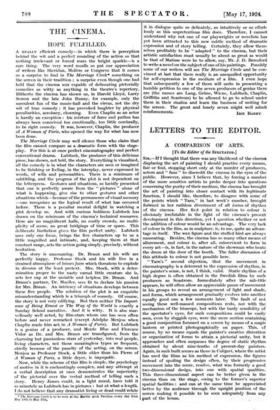THE CINEMA.
HOPE FULFILLED.
A REALLY efficient comedy—in which there is perception behind the wit and a perfect rounding of the action so that nothing irrelevant or forced mars the bright sparkle—is a rare thing. The very word recalls so pat our appreciation of writers like Sheridan, Moliere or Congreve that it comes as a surprise to find in The Marriage Circle* something on the screen in their tradition ; a surprise even though one had held that the cinema was capable of delineating pictorially comedies as witty as anything in the theatre's repertory. Hitherto the cinema has shown us, in Harold Lloyd, Larry Semon and the late John Bunny, for example, only the succulent fun of the music-hall and the circus, not the dry wit of true comedy ; it has provoked laughter by physical peculiarities, acrobaey, clowning. Even Chaplin as an actor is hardly an exception : his mixture of farce and pathos has always been conceived too emotionally, too little cerebrally, to be right comedy. It was, however, Chaplin, the producer of A Woman of Paris, who opened the way for what has now been done.
The Marriage Circle may well silence those who claim that the film cannot compare as a dramatic form with the stage- play. For this is at once perfect cinematography and perfect conventional drama. Lubitsch, the producer of this delicious piece, has shown, not told, the story. Everything is visualized, all the comedy is in what the characters are seen or imagined to be thinking or feeling, in the interplay, never expressed in words, of wills and personalities. There is a minimum of subtitling, and the progress of the plot is not dependent on the letterpress. Gestures and situations, so lucidly presented that one is perfectly aware from the " pictures " alone of what is happening, give rise to other gestures and other situations which—because of the permanence of visual memory —one recognizes as the logical result of what has occurred before. There is a peculiar mental delight in watching a plot develop so. And with curious boldness Lubitsch has drawn on the minimum of the cinema's technical resources. Here are no magnificent halls, no costly crowds, no multi- plicity of scene, no great bridgings of time or space. This deliberate. limitation gives the film perfect unity. Lubitsch uses only one focus, brings the five chaiacters up to us a little magnified and intimate, and, keeping them at that constant range, sets the action going simply, precisely, without hesitation.
The story is unassuming. Dr. Braun and his wife are perfectly happy. Professor Stock and his wife live in a strained atmosphere of laissez faire which threatens to explode in divorce at the least pretext. Mrs. Stock, with a deter- mination proper to the nasty carnal little creature she is, sets her cap at the amiable and helpless Dr. Braun: And Braun's partner, Dr. Mueller, sees fit to declare his passion for Mrs. Braun. An intricacy of situations develops between these five people. The solution of the plot is an exquisite misunderstanding which is a triumph of comedy. Of course, the story is not very edifying. But then neither The Import- ance of Being Ernest or The Way of the World is exactly a Sunday School narrative. And it is witty. It is also mar- vellously well acted, by film-stars whom one has seen often before and never remarked (except Adolphe Menjou when Chaplin made him act in A .Woman of Paris). But Lubitsch is a genius of a. producer, and Monte Blue and Florence Vidor as Dr. and Mrs. Braun are transfigured, froth the charming but passionless stars- of yesterday, into real people, living characters, not those meaningless types so frequent, chiefly because of the paucity of the acting, on the screen. Menjou as Professor Stock, a little older than his Pierre of A Woman of Paris, a little dryer, is impayable.
Now, while the scheme of this film is simple, the psychology of motive in it is enchantingly complex, and any attempt at a verbal description at once demonstrates the superiority of the pictorial over the verbal method of telling such a story. Henry James could, in a light mood, have told it as minutely as Lubitsch has in pictures : but at what a length. I do not believe that any dramatist living or dead could relate
• The Marriage Circle Is to be seen at the Marble Arch Pavilion every day from May 1oth to May 31at.,
it in dialogue quite so delicately, so intuitively or so effort- lessly as this unpretentious film does. Therefore, I cannot understand why not one of our playwrights or novelists has yet been attracted to this new subtle method of dramatic expression and of story telling. Certainly, they allow them- selves profitably to be " adapted " to the cinema, but their artistic satisfaction must usually be about as great as would be that of Matisse were he to allow, say, Mr. J. D. Beresford to write a novel on the subject of one of his paintings. Possibly some of our writers will see The Marriage Circle and be con- vinced at last that there really is an unequalled opportunity for self-expression in the medium of a film. I even hope that subsequently a few of them will unite in presenting a humble petition to one of the seven producers of genius there are (the names are Lang, Grilne, Wiene, Lubitsch, Chaplin, Griffiths and Seastrom) to be allowed to go to school under them in their studios and learn the business of writing for the screen. The great and lonely seven might well admit


















































 Previous page
Previous page